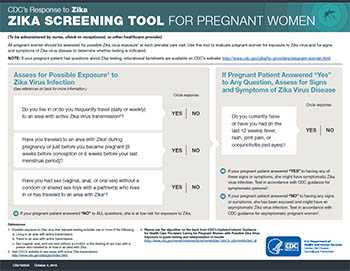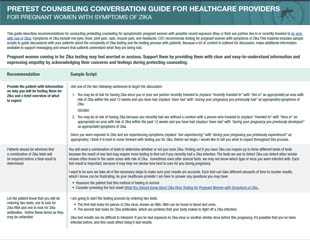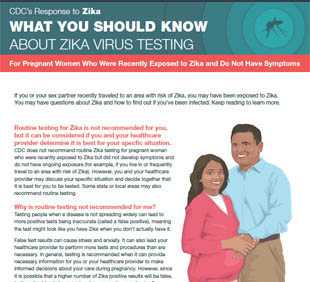Healthcare Providers Caring for Pregnant Women
Summary
- CDC recommends that pregnant women should not travel to areas with risk of Zika. This includes all areas with documented or likely Zika virus transmission (see WHO categories for more information). If a pregnant woman must travel to one of these areas, she should be counseled to strictly follow steps to avoid mosquito bites and prevent sexual transmission of Zika during and after the trip.
- Pregnant women with Zika symptoms and with possible Zika exposure should be tested for Zika virus infection. Possible Zika exposure includes living in or having recently traveled to an area with documented or likely Zika virus transmission, or having had sex without a condom with a person who lives in or has traveled to an area with risk of Zika.
- Pregnant women with no Zika symptoms but who have ongoing Zika exposure should be offered Zika testing.
- Testing is no longer routinely recommended for pregnant women with no Zika symptoms who have recent possible exposure to Zika but no ongoing exposure. However, testing should be considered using a shared decision-making model that includes pretest counseling, individualized risk assessment, clinical judgment, patient preferences, and the jurisdiction’s recommendations.
-
- Testing recommendations for this group of pregnant women may differ by jurisdiction. Please contact your state, tribal, local, or territorial health department for jurisdiction specific guidance.
Guidance
- UPDATE: Interim Guidance for Health Care Providers Caring for Pregnant Women with Possible Zika Virus (MMWR, July 24, 2017)
- HAN Advisory: Prolonged IgM Antibody Response in People Infected with Zika Virus: Implications for Interpreting Serologic Testing Results for Pregnant Women (May 5, 2017)
- HAN Advisory: CDC Updates Guidance for Pregnant Women and Women and Men of Reproductive Age for Zika Virus Infection Related to the Ongoing Investigation of Local Mosquito-borne Zika Virus Transmission in Miami-Dade County, Florida (October 19, 2016)
- HAN Advisory: CDC Guidance for Travel and Testing of Pregnant Women and Women of Reproductive Age for Zika Virus Infection Related to the Investigation for Local Mosquito-borne Zika Virus Transmission in Miami-Dade and Broward Counties, Florida (HAN, Aug. 1, 2016)
- Interim Guidance for Health Care Providers Caring for Pregnant Women with Possible Zika Virus Exposure – United States, July 2016 (MMWR, Jul. 25, 2016)
- Interim Guidance for Health Care Providers Caring for Women of Reproductive Age with Possible Zika Virus Exposure – United States, 2016 (MMWR, Mar. 25, 2016)
- Interim Guidelines for Health Care Providers Caring for Pregnant Women and Women of Reproductive Age with Possible Zika Virus Exposure – United States, 2016 (MMWR, Feb. 5, 2016)
- Interim Guidelines for Pregnant Women During a Zika Virus Outbreak—United States, 2016 (MMWR, Jan. 22, 2016)
Special Notice – March 13, 2017
CDC provides an update on potential increased risk of Zika virus exposure from semen
Because of Zika virus transmission in Miami-Dade County, FL, evidence concerning the persistence of Zika virus in semen1, ongoing concern about undiagnosed asymptomatic infections, challenges associated with defining sources of exposure, and concern that male residents of Broward and Palm Beach counties may have traveled to areas in Miami-Dade County2, there is a small potential risk of Zika virus transmission associated with exposure to semen from male residents in the Florida tri-county area of Miami Dade, Palm Beach, and Broward counties since June 15, 2016 (the start date for the first CDC health advisory3).
In consultation with their healthcare providers, women and their partners should take this potential risk into consideration when trying to conceive. Additionally, healthcare providers should counsel pregnant women who might be exposed to semen from men potentially infected with Zika virus about this risk and consult existing CDC guidance for evaluating and caring for them.
See CDC’s current guidance for residents and visitors to Miami-Dade County.
See more information on blood and tissue safety in the United States
Featured Tools
Screening and Testing
Footnotes
1Zika virus RNA can persist in semen for up to 6 months and therefore any men with any travel to Miami-Dade County could transmit the virus through semen (sexually or donated) for 6 months after onset of infection. Paz-Bailey G, Rosenberg ES, Doyle K, Munoz-Jordan J, Santiago GA, Klein L, Perez-Padilla J, Medina FA, Waterman SH, Gubern CG, Alvarado LI, Sharp TM. Persistence of Zika Virus in Body Fluids – Preliminary Report. N Engl J Med. 2017; Feb 14. doi: 10.1056/NEJMoa1613108. [Epub ahead of print]
2People move fluidly and regularly between Miami-Dade, Broward, and Palm Beach to live, work, attend school, shop, socialize, and seek medical care. These individuals may not regard these activities as travel.
3CDC Guidance for Travel and Testing of Pregnant Women and Women of Reproductive Age for Zika Virus Infection Related to the Investigation for Local Mosquito-borne Zika Virus Transmission in Miami-Dade and Broward Counties, Floridahttps://emergency.cdc.gov/han/han00393.asp
- Page last reviewed: July 24, 2017
- Page last updated: July 24, 2017
- Content source:


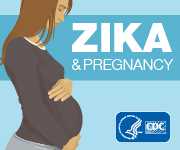
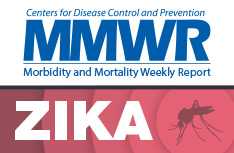

 ShareCompartir
ShareCompartir
